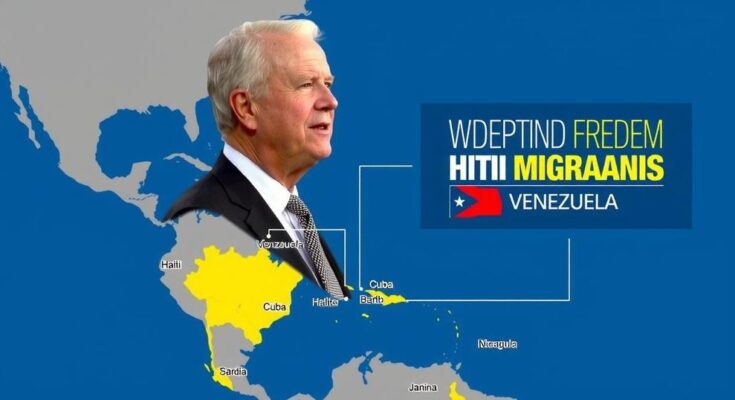The Biden administration has opted not to renew a two-year program for migrants from Venezuela, Haiti, Cuba, and Nicaragua, allowing them entry into the U.S. with sponsorship. This decision impacts thousands who had previously received humanitarian benefits under the program, requiring them to seek alternative legal status or risk deportation. The announcement occurs in the context of heightened political scrutiny on immigration as the 2024 election approaches.
The Biden administration has announced that it will not renew a two-year program designed to permit migrants from Venezuela, Haiti, Cuba, and Nicaragua to enter the United States with sponsorship after arriving by plane. Launched in 2022 as a response to the growing number of migrants attempting to cross at the U.S.-Mexico border, it aimed to provide legal avenues for these groups amidst tightened border enforcement. The program previously allowed them to reside and work in the U.S. for two years while seeking additional legal status.
The two-year program initially focused on Venezuelan migrants before expanding to include Cubans, Haitians, and Nicaraguans, who had been particularly vulnerable during the border crisis. Under this initiative, approximately 214,000 Haitians, 117,000 Venezuelans, 111,000 Cubans, and 96,000 Nicaraguans were able to move to the U.S. The Department of Homeland Security has indicated that individuals in the program must now seek other legal statuses or face the risk of deportation. Furthermore, despite the conclusion of this program, new migrants are still eligible to apply, while Afghans and Ukrainians are excluded from this decision.
The decision not to extend the program signifies a significant shift in the administration’s immigration policy, particularly as the 2024 presidential election looms. With imposed restrictions on current beneficiaries and ongoing tensions regarding their status, the evolving immigration landscape remains a critical issue. This change could have substantial ramifications for communities across South Florida and beyond, highlighting the complexities involved in managing U.S. immigration policy while addressing humanitarian concerns and political pressures.
Original Source: www.wlrn.org




